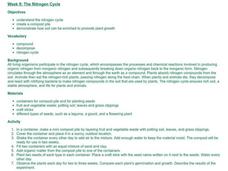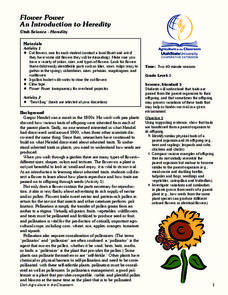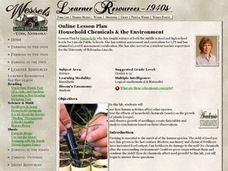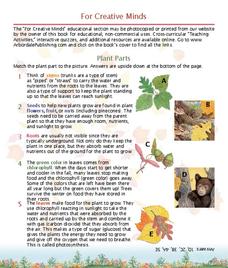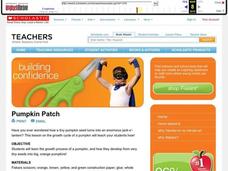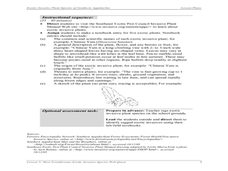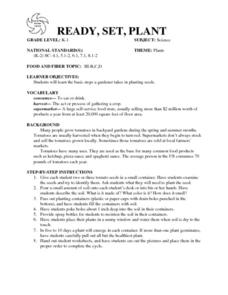Curated OER
Dyed Flower Garden
Learners create a dyed flower garden. In this art lesson, students read the book Tiny Seed and cut flowers out of tissue paper to create a paper flower garden.
Curated OER
Conserving Resources by Watering Efficiently
Students determine a watering schedule that promotes healthy grass growth. In this plants and natural resource conservation lesson, students plant grass seed in liter bottles and follow two different schedules that include "more...
Curated OER
Observing Pods
Students observe the pistil growing into a tiny string bean-like seed pod. They then observe the development of the fertilized pods between Day 17 and Day 35 and record their observations by drawing and labeling, writing, and graphing. ...
Curated OER
The Nitrogen Cycle
Pupils design and create a compost pile in order to study the Nitrogen Cycle. They then use the scientific method to determine if plants grow better when they add organic matter from their compost pile to the plant's soil.
Curated OER
Squanto's Science Lesson
Students explore Squanto's contribution to the settlers. They plant seeds and follow instructions for water and fertilization. Students keep a record of the growth of the seeds. They write a paragraph that tells what they learned from...
Curated OER
Four Parts of a Green Plant and the Functions of Each Part
Young scholars look into plants. In this science lesson plan, students discover the four parts of a green plant and the functions of each part.
Curated OER
Flower Power: An Introduction to Heredity
Students observe flowers and how they grow according to heredity. In this flowers lesson plan, students observe physical traits that make flowers the offspring of other flowers, and fill out worksheets according to their findings.
Curated OER
Plant Adaptations
Students identify parts of prairie plants. They sketch the plants indicating its adaptive parts and write brief descriptions of them. They present their findings to the class.
Curated OER
Earth Day - Bursting Beans
Students fill jars with dried beans and water, cover the jars, and wait to see what happens in this excellent Science experiment ideal for Earth Day (April 22nd). Emphasis is placed on discovering the reactions of seeds to water.
Curated OER
Aztec Floating Gardens
Aztecs created amazing hydroponic gardens called Chinampas, to grow their crops. Learners in grades k-7 engage in four mini-experiments to understand just how amazing floating gardens are. Tip: A perfect way to bring science into your...
Curated OER
CLOTHESLINE SLEUTH
Young scholars will trace origins of various forms of clothing to their agricultural sources.String a cotton cord across the top of a blackboard to resemble a clothesline. 2. Bring a variety of clothing articles to class made from a...
Curated OER
Household Chemicals & the Environment
Students conduct a laboratory experiment designed to investigate the effects of chemicals, soil quality and pollution on seed growth and plant yield. They consider how best to maximize agriculture in the long term.
Curated OER
Introduction to Nutrition and Gardening
Students examine the different parts of a plant and each ones role. In this exploratory lesson plan students complete several activities including a game of charades.
Curated OER
Dichotomous Key for Identifying Pine Trees
Middle schoolers identify the species of pine trees that are found in their area. They use unlabeled "mystery" samples and a dichotomous key to identify the pine trees to species. After identification, they use a field guide to answer...
Curated OER
Sprouting Sprouts!
Students plant sprout seeds and make observations. In this lesson about planting, students make observations, predictions, and record information. Students analyze how the sprout plants grow and determine if any of the four sprout seeds...
Curated OER
Sunlight Necklaces
Third graders review the placement and role of the sun in the solar system. Using beads, they create a necklace which they can use to identify the amount of sunlight is being illuminated. In groups, they record observations on the...
Curated OER
Plant Parts
Students recognize the parts of the plant and the function it provides.In this plant parts lesson plan, students participate in three activities relating to plant parts and properties.
Curated OER
Pumpkin Patch
Students create a pumpkin art project that outlines the life cycle of a pumpkin in order to learn the growth process of this particular vegetable. In this pumpkin art lesson, students first review the life cycle of a pumpkin as a class,...
Curated OER
Most Troublesome Exotic Invasive Plant Species Web Quest
Learners participate in a Web Quest activity in which they identify common exotic invasive plant species of the Southern Appalachian Region. After identifying the top 10 exotic invasive species, they choose one to research in depth.
Curated OER
Land Use Issues
Learners discover seeds are a source of life. They also label the parts of a seed and examine the conditions which are needed for the seed to start growing. They follow the life cycle of seeds.
Curated OER
Teaching Biology Through Problem-based Activities
Young scholars plant seeds and observe the life cycle of the organism. They experimentally research the effects of radiation on seed growth. Students determine the effects of environmental pollutants on harvested seed.
Curated OER
Temperature Effects
Students witness effects of temperature on plants. They also change temperature from a Celsius or Fahrenheit thermometer.
Curated OER
Living Corn Necklace
Fifth graders explore heredity and observable traits through experimentation. They view several different types of corn and record their observation of physical traits on a class chart. They create a corn necklace by sprouting dried...
Curated OER
READY, SET, PLANT
Students identify the basic steps a gardener takes in planting seeds. Students identify the many uses of tomatoes. Students examine the seeds and try to identify them. Students place their plants in a sunny window and water them when...





